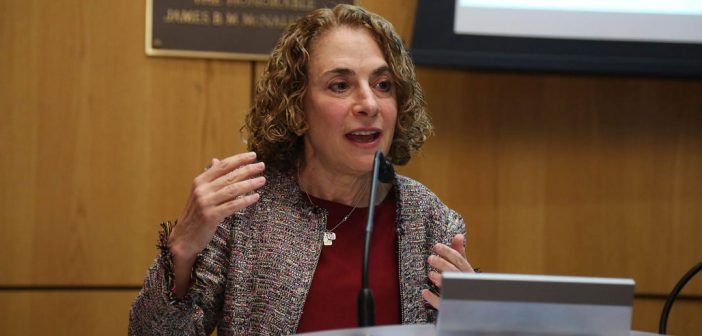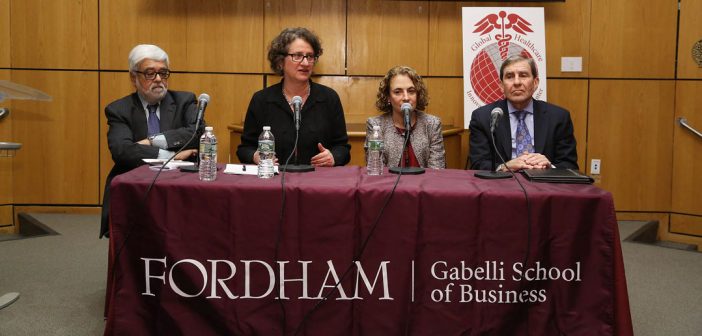When Elisabeth Rosenthal— an award-winning journalist and former ER physician— began researching the business of health care, she didn’t have to look further than the hospital bills of many Americans for signs of what she calls “a dysfunctional medical market.”
“I would call people in other countries and say, ‘What’s your facility fee for an operating room’,” said Rosenthal, author of An American Sickness (Penguin Press, 2017). “And I’d hear this silence and they would go, ‘What do you mean a facility fee?’”
Rosenthal was the speaker at an April 18 talk and panel discussion organized by the Gabelli School’s Global Healthcare Innovation Management Center. She holds an M.D. degree from Harvard Medical School and currently works as the editor-in-chief of Kaiser Health News, a nonprofit news service that reports on the health care system. A former health care reporter for the New York Times, she is best known for her award-winning series on the costs of health care called “Paying Till It Hurts.” Through her research and conversations with patients, practitioners, and other health professionals, she said, she learned that medical concepts like facility fees are “uniquely American.”
According to Rosenthal, there are evidence-based studies about how medicine should be practiced in the U.S., yet economic incentives remains a top priority for many hospitals.
“We know what things work, but there is a lot of financial interests against them working,” Rosenthal said.
Cautionary Tales
According to the Centers for Medicare & Medicaid Services, U.S. health care spending increased 4.3 percent in 2016 to reach $3.3 trillion. The agency projected that national health spending will grow at an average rate of 5.5 percent per year to reach $5.7 trillion by 2026.
In an age of hospital consolidations, Rosenthal said illnesses have become a form of commerce. This has led many Americans to seek alternative options in countries like Canada.
“That’s a sign of a broken system if there ever was one,” said Rosenthal.
One cautionary tale Rosenthal told was the story of a 28-year-old college student from Texas who was charged $17, 850 for a routine test that checked her urine for a host of things, unbeknownst to her, including opioids, amphetamines, and other classes of drugs.
“If you don’t ask these questions upfront, this could be you,” said Rosenthal. “That urine test was sent off to a lab that tested it for everything under the sun and it was out of network.”
Rosenthal said patients are often left with astronomical medical bills because they are billed by out-of-network medical assistants and other hospital staffers who treat them after surgery without their knowledge. Advances in treatment for conditions such as diabetes and astigmatism can also lead to increases in the costs of care. As hospitals became conglomerates, she said, they also began to look less like medical facilities and more like luxury hotels equipped with everything from indoor waterfalls to flat-screen TVs.
“We’re paying for amenities rather than care, and that, I think is a flaw of our system,” she said.
Though ambulance companies used to be volunteer-run and operated mostly by the fire department and local EMS more than 30 years ago, Rosenthal said they too have adopted a business model. According to Rosenthal, many ambulances charge by the mile and bill riders different rates based on whether they were treated by a paramedic or EMT. The ride can cost up to $2,000, she said.
Rosenthal said fees like these can be a burden for middle-class and lower-class patients who are struggling to make ends meet.
“If you don’t have a disposable income, the weight is infinite.”
Pushing Back at the System
Rosenthal believes many hospital facilities and physicians get away with unfairly charging patients for visits, exams, and procedures because patients often “scarily write checks” to avoid having their bills being sent to collection agencies.
“Medical bills are not like you made a choice where you know upfront what you’re paying for and you’re being delinquent,” she said. “It’s often [that]you didn’t know. You get these confusing bills and you’re trying to figure it out and that can take months.”
She encouraged patients to become proactive about health care by negotiating hospital bills; requesting itemized bills; asking for referrals to in-network physicians, labs, and facilities; and requesting estimates of tests and surgeries beforehand so there are fewer surprises.
“There is something that everyone can do to push back at the system,” she said.
Financially Rational Decisions
After her talk, Rosenthal was joined by internist Barney D. Newman, M.D., co-founder of WestMed Medical Group, and Mitra Behroozi, executive director of the 1199 SEIU Benefit and Pension Funds, a labor-management fund, for a panel discussion about the state of health care.
Behroozi explained that the decision to go to the doctor or the ER is still a difficult decision for many Americans.
“People will make financially rational decisions— especially if a $50 co-pay [at the ER]could mean the difference between being able to afford their transportation to go to work or not that week,” she said.
Newman noted that these economic strains are often the result of hospital CFOs and other finance personnel looking to generate high return on investment rather than being concerned about efficient clinical care. Still, he believes there are ways to use business to enhance the health care system.
“The consolidation of health care and the idea of applying business principles to health care is not all bad,” said Newman. “It has been focused on only the financial part of the outcome. There are actually a lot of opportunities to reduce cost in this country and improve quality by trying to apply classic business practices of quality management and continuous quality improvement to the process of care and how care is delivered.”




